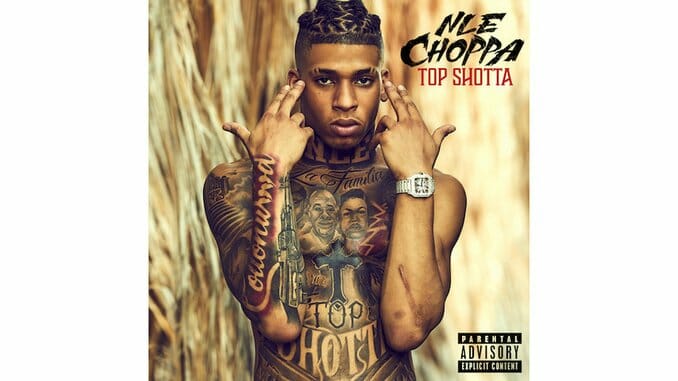There’s a Story Behind NLE Choppa’s Bullets
The young rapper's major label debut, Top Shotta, is at its best when he's open, honest and emotional

NLE Choppa jokes about the pronunciation of “underwear” with his mom on Instagram Live. On Twitter, he records his emotions like he’s writing in a very public diary. He paints a distinct picture of himself across all social media platforms: a 17-year-old-kid who’s every bit the jokester and dancer and who has become a driving force in rap’s next generation. But when it comes to his music, that detailed portrait becomes a crudely drawn sketch. With an array of cartoonishly violent threats spread out across his small catalogue, it was previously impossible to know exactly who he is or what he valued strictly from the music itself. That changes with his major label debut, Top Shotta, an overly-long introduction to the man behind the maelstrom of violence he raps about. It takes a while to get to its point, but when it does, Top Shotta proves that NLE Choppa has quite the story to tell when he’s speaking from the heart.
At 16, Bow Wow was making songs about blushingly taking his crush shopping. When NLE Choppa was 16, his breakout song was about keeping a ratchet like tennis. In the short year-and-a-half since he released “Shotta Flow,” NLE Choppa hasn’t stopped cooking up inventive ways to rap about guns. His debut EP, Cottonmouth, painted him as a pistol-toting product of his environment, one who brushed his teeth with a Glock and gargled with blood. At every turn, he turned the scene into Thriller, referenced guys on the news (and wondered if you heard about them) and compared himself to a member of the Black Panther Party—all in service of establishing a villainous personality larger than his own.
Top Shotta picks up right where Cottonwood left off—with NLE Choppa’s guns cocked and aimed at the listener. He stomps through wet grass on “Daydream” and vehemently squeals about a shootout in traffic. Immediately after, he lurks in a car before spilling bullets on “Double Bacc,” setting the stage for the album’s direction like the initial missions in an Assassin’s Creed videogame.
You’ll be tempted to write the album off at face level; a lot of rappers tend to focus on enacting violence. But very few are as detailed as NLE Choppa, and his descriptions keep the LP interesting through the grating points in the first half. By the time “Murda Talk” rolls around, you’re practically an expert on NLE Choppa’s school of gunplay, but his intricate explanation of creeping through someone’s door before chasing them drops you in on the scene, peeking from behind a crack in your hands. As he’s showcased before, one of NLE Choppa’a strengths is his creative dexterity, being able to flip these angry bars into a melodic style that’s smooth and easy on the ears. This skill is best displayed on “Make Em Say” where he practically moans over the chorus as he and Mulatto describe rounds of good sex. Vulgarity isn’t really a strongpoint for Choppa, but his switched style breaks up the monotony.
-

-

-

-

-

-

-

-

-

-

-

-

-

-

-

-

-

-

-

-

-

-

-

-

-

-

-

-

-

-

-

-

-

-

-

-

-

-

-

-








































